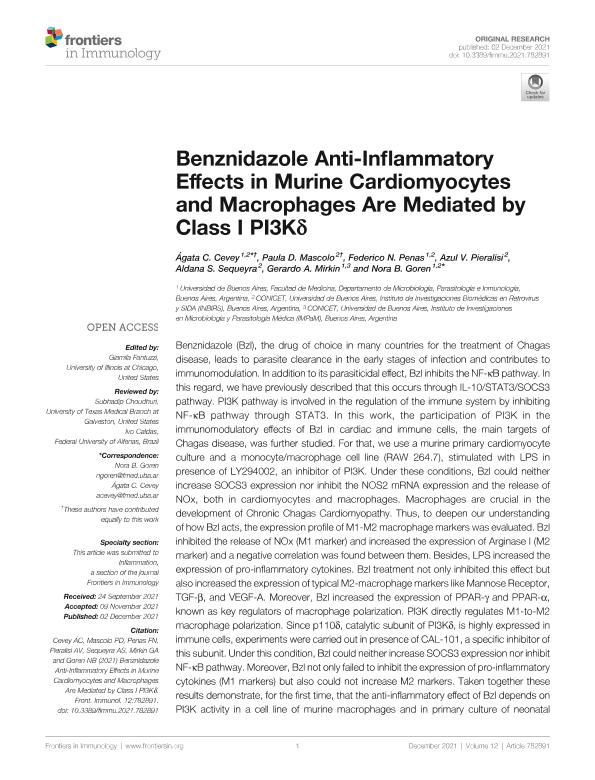Artículo
Benznidazole Anti-Inflammatory Effects in Murine Cardiomyocytes and Macrophages Are Mediated by Class I PI3Kδ
Cevey, Ágata Carolina ; Mascolo, Paula Denise; Penas, Federico Nicolás
; Mascolo, Paula Denise; Penas, Federico Nicolás ; Pieralisi, Azul Victoria
; Pieralisi, Azul Victoria ; Sequeyra, Aldana Soledad; Mirkin, Gerardo Ariel Isidoro; Goren, Nora Beatriz
; Sequeyra, Aldana Soledad; Mirkin, Gerardo Ariel Isidoro; Goren, Nora Beatriz
 ; Mascolo, Paula Denise; Penas, Federico Nicolás
; Mascolo, Paula Denise; Penas, Federico Nicolás ; Pieralisi, Azul Victoria
; Pieralisi, Azul Victoria ; Sequeyra, Aldana Soledad; Mirkin, Gerardo Ariel Isidoro; Goren, Nora Beatriz
; Sequeyra, Aldana Soledad; Mirkin, Gerardo Ariel Isidoro; Goren, Nora Beatriz
Fecha de publicación:
12/2021
Editorial:
Frontiers Media
Revista:
Frontiers in Immunology
ISSN:
1664-3224
Idioma:
Inglés
Tipo de recurso:
Artículo publicado
Clasificación temática:
Resumen
Benznidazole (Bzl), the drug of choice in many countries for the treatment of Chagas disease, leads to parasite clearance in the early stages of infection and contributes to immunomodulation. In addition to its parasiticidal effect, Bzl inhibits the NF-κB pathway. In this regard, we have previously described that this occurs through IL-10/STAT3/SOCS3 pathway. PI3K pathway is involved in the regulation of the immune system by inhibiting NF-κB pathway through STAT3. In this work, the participation of PI3K in the immunomodulatory effects of Bzl in cardiac and immune cells, the main targets of Chagas disease, was further studied. For that, we use a murine primary cardiomyocyte culture and a monocyte/macrophage cell line (RAW 264.7), stimulated with LPS in presence of LY294002, an inhibitor of PI3K. Under these conditions, Bzl could neither increase SOCS3 expression nor inhibit the NOS2 mRNA expression and the release of NOx, both in cardiomyocytes and macrophages. Macrophages are crucial in the development of Chronic Chagas Cardiomyopathy. Thus, to deepen our understanding of how Bzl acts, the expression profile of M1-M2 macrophage markers was evaluated. Bzl inhibited the release of NOx (M1 marker) and increased the expression of Arginase I (M2 marker) and a negative correlation was found between them. Besides, LPS increased the expression of pro-inflammatory cytokines. Bzl treatment not only inhibited this effect but also increased the expression of typical M2-macrophage markers like Mannose Receptor, TGF-β, and VEGF-A. Moreover, Bzl increased the expression of PPAR-γ and PPAR-α, known as key regulators of macrophage polarization. PI3K directly regulates M1-to-M2 macrophage polarization. Since p110δ, catalytic subunit of PI3Kδ, is highly expressed in immune cells, experiments were carried out in presence of CAL-101, a specific inhibitor of this subunit. Under this condition, Bzl could neither increase SOCS3 expression nor inhibit NF-κB pathway. Moreover, Bzl not only failed to inhibit the expression of pro-inflammatory cytokines (M1 markers) but also could not increase M2 markers. Taken together these results demonstrate, for the first time, that the anti-inflammatory effect of Bzl depends on PI3K activity in a cell line of murine macrophages and in primary culture of neonatal cardiomyocytes. Furthermore, Bzl-mediated increase expression of M2-macrophage markers involves the participation of the p110δ catalytic subunit of PI3Kδ.
Archivos asociados
Licencia
Identificadores
Colecciones
Articulos(INBIRS)
Articulos de INSTITUTO DE INVESTIGACIONES BIOMEDICAS EN RETROVIRUS Y SIDA
Articulos de INSTITUTO DE INVESTIGACIONES BIOMEDICAS EN RETROVIRUS Y SIDA
Citación
Cevey, Ágata Carolina; Mascolo, Paula Denise; Penas, Federico Nicolás; Pieralisi, Azul Victoria; Sequeyra, Aldana Soledad; et al.; Benznidazole Anti-Inflammatory Effects in Murine Cardiomyocytes and Macrophages Are Mediated by Class I PI3Kδ; Frontiers Media; Frontiers in Immunology; 12; 12-2021; 1-14
Compartir
Altmétricas



